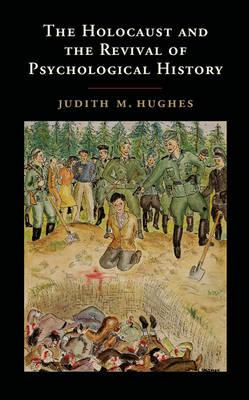Overview
Why did men and women in one of the best educated countries in the Western world set out to get rid of Jews? In this book, Judith M. Hughes focuses on how historians' efforts to grapple anew with matters of actors' meanings, intentions, and purposes have prompted a return to psychoanalytically informed ways of thinking. Hughes makes her case with fine-grained analyses of books by Hugh Trevor-Roper, Ian Kershaw, Daniel Goldhagen, Saul Friedländer, Christopher Browning, Jan Gross, Hannah Arendt and Gitta Sereny. All of the authors pose psychological questions; the more astute among them shed fresh light on the Holocaust - without making the past any less disturbing.
Full Product Details
Author: Judith M. Hughes (University of California, San Diego)
Publisher: Cambridge University Press
Imprint: Cambridge University Press
Dimensions:
Width: 14.50cm
, Height: 1.70cm
, Length: 22.20cm
Weight: 0.390kg
ISBN: 9781107056824
ISBN 10: 1107056829
Pages: 208
Publication Date: 31 October 2014
Audience:
Professional and scholarly
,
College/higher education
,
Professional & Vocational
,
Tertiary & Higher Education
Format: Hardback
Publisher's Status: Active
Availability: Available To Order

We have confirmation that this item is in stock with the supplier. It will be ordered in for you and dispatched immediately.
Reviews
'Elegant and accessible, Judith M. Hughes's sober discussion probes the inner lives of Holocaust perpetrators through the lens of widely read researchers. Her book is a reminder of how varied and challenging have been responses to one of the most unsettling questions of our time: 'how could they do it? Michael R. Marrus, Chancellor Rose and Ray Wolfe Professor Emeritus of Holocaust Studies, University of Toronto 'In this gracefully written and quite absorbing review of the historiography of the Holocaust, Hughes clarifies the psychological questions posed implicitly or explicitly by the historians. Along the way she has much of interest to say about the personalities of both the perpetrators and their chroniclers.' Timothy Snyder, Bird White Housum Professor of History, Yale University 'The historian and psychoanalyst Judith Hughes has produced a book that will allow nonspecialists to return to past debates on the Holocaust. Her volume examines prominent figures, including Adolf Hitler, Adolf Eichmann and Albert Speer; their biographers, including Ian Kershaw, Hannah Arendt and Gita Sereny; and controversies surrounding German and Polish complicity in the persecution of the Jews, including Daniel Goldhagen's Hitler's Willing Executioners and Jan Gross's Neighbors.' Anthony D. Kauders, German History
'Elegant and accessible, Judith Hughes's sober discussion probes the inner lives of Holocaust perpetrators through the lens of widely read researchers. Her book is a reminder of how varied and challenging have been responses to one of the most unsettling questions of our time: 'how could they do it? Michael R. Marrus, Chancellor Rose and Ray Wolfe Professor Emeritus of Holocaust Studies, University of Toronto 'In this gracefully written and quite absorbing review of the historiography of the Holocaust, Hughes clarifies the psychological questions posed implicitly or explicitly by the historians. Along the way she has much of interest to say about the personalities of both the perpetrators and their chroniclers.' Timothy Snyder, Bird White Housum Professor of History, Yale University
Advance praise: 'Elegant and accessible, Judith Hughes's sober discussion probes the inner lives of Holocaust perpetrators through the lens of widely read researchers. Her book is a reminder of how varied and challenging have been responses to one of the most unsettling questions of our time: 'how could they do it? Michael R. Marrus, Chancellor Rose and Ray Wolfe Professor Emeritus of Holocaust Studies, University of Toronto Advance praise: 'In this gracefully written and quite absorbing review of the historiography of the Holocaust, Hughes clarifies the psychological questions posed implicitly or explicitly by the historians. Along the way she has much of interest to say about the personalities of both the perpetrators and their chroniclers.' Timothy Snyder, Bird White Housum Professor of History, Yale University
Author Information
Judith M. Hughes is a Professor of History and an Adjunct Professor of Psychiatry at the University of California, San Diego. She is also on the faculty of the San Diego Psychoanalytic Institute and has a small psychoanalytic practice. She is the author of seven previous books, including To the Maginot Line: The Politics of French Military Preparation in the 1920s; From Freud's Consulting Room: The Unconscious in a Scientific Age; From Obstacle to Ally: The Evolution of Psychoanalytic Practice; and Guilt and its Vicissitudes: Psychoanalytic Reflections on Morality.




